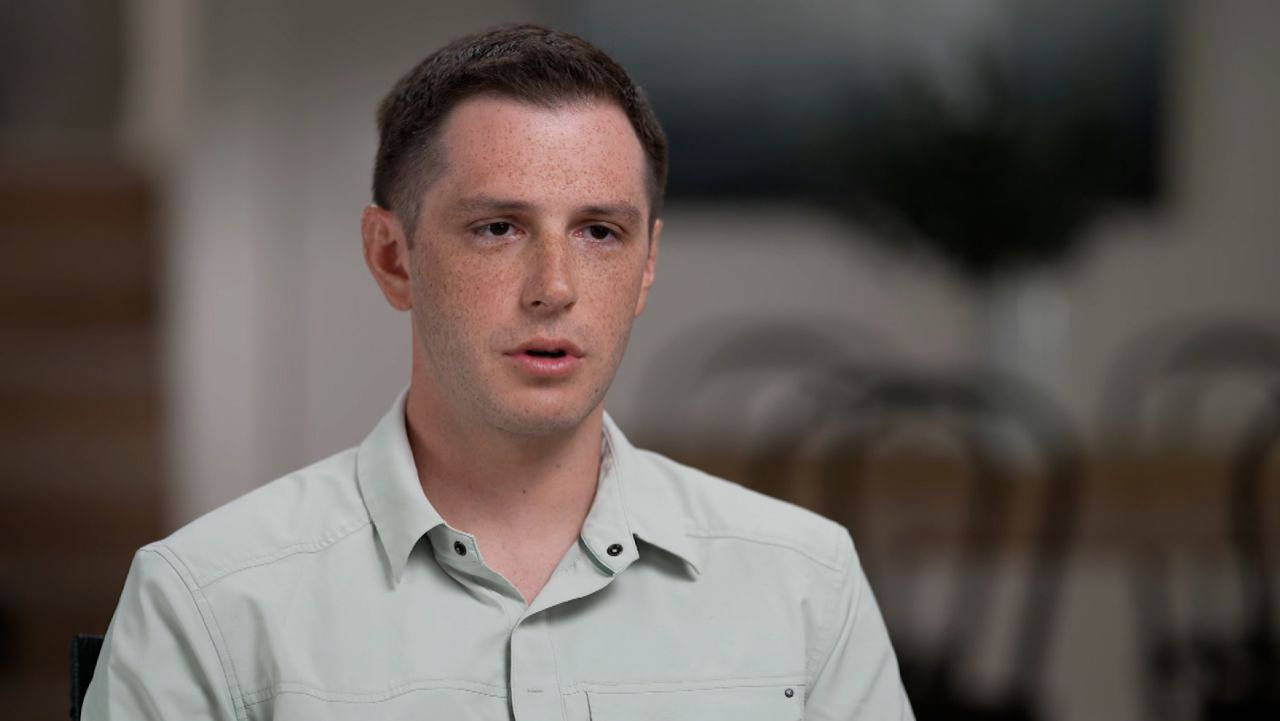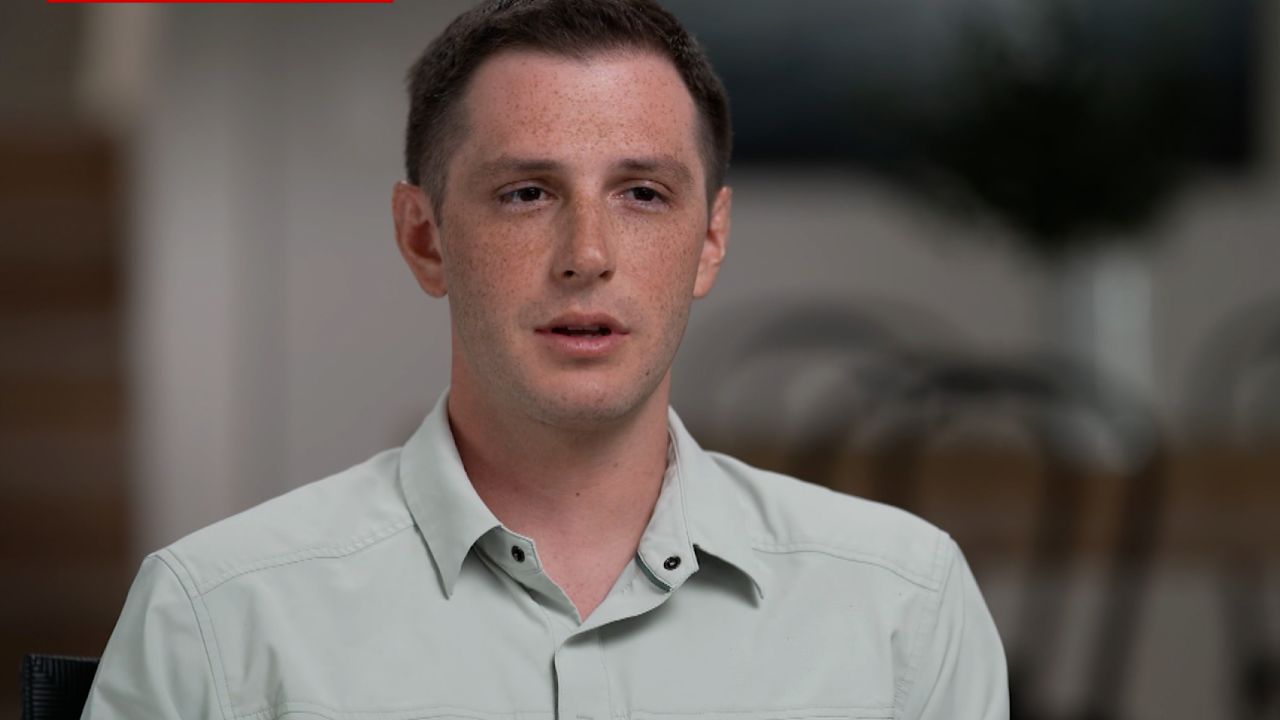Editor’s Note: You can watch Jake Tapper’s exclusive interview with Trevor Reed in a CNN Special Report: “Finally Home: The Trevor Reed Interview,” on CNN and CNN International on Sunday, May 22, at 8 p.m. ET.
Trevor Reed, in his first television interview since returning to the United States after being imprisoned in Russia, recounted the background and horrifying conditions of his detention as well as the prisoner swap that ended a nearly three-year ordeal for him and his family.
Reed told Jake Tapper in the CNN Special Report: “Finally Home: The Trevor Reed Interview,” which aired Sunday night, that he’s feeling a little better each day since coming home less than a month ago.
“The last couple of days, it’s been more real to me. But there’s a time there where you just don’t accept that at all. That you’re back. You can’t understand that you’re actually free,” he said.
Reed, an American citizen and former Marine, was sentenced to nine years in prison in July 2020 after being accused of endangering the “life and health” of Russian police officers in an altercation the previous year. He and his family have denied the charges against him.
As part of a prisoner exchange with the US for Konstantin Yaroshenko, a Russian smuggler convicted of conspiring to import cocaine, Reed was freed from Russia in late April. The US commuted Yaroshenko’s sentence.
The arrest
During the summer of 2019, Reed traveled to Moscow planning to spend it with his girlfriend, a lawyer named Lina Tsybulnik. After the couple attended a party one evening that included heavy drinking, Reed blacked out and became ill on the side of the road before police arrived on the scene and took him to the station lobby, he told CNN.
Reed said he slept in the lobby and expected to leave in the morning; but when he was waiting to get a ride home from his girlfriend, a change of duty took place.
Reed recalled: “The new officers came in with a new police chief. He saw that I was speaking English with the duty there. … And after about three minutes, they came back and told me that I could not leave. I did try to ask them why. But they wouldn’t answer me about that.”
Reed said officers from FSB, the successor organization to the KGB, came in about 10 minutes later.
When Tsybulnik arrived at the station, Reed said, the officers claimed that he’d been arrested for assaulting officers inside the police station. But when Tsybulnik asked for camera footage, the police stopped speaking to them. The police later changed their story to say that Reed assaulted the officers in the police car on the way to the station, he said.
“Lina was following the police car to the police station. And she said, you know, obviously that didn’t happen,” Reed recalled. “My defense team did end up getting video from the road where this had supposedly happened, and they were able to prove that none of that happened.”
Reed also believes he was beaten by officers while he was passed out in the station.
Reed’s life inside Russian prison
During his time as a prisoner in Russia, Reed refused to admit any guilt. He refused to participate in work while at a work camp, which led to solitary confinement. And he took part in hunger strikes to protest the labor camp and get medical attention.
Time in prison took a physical toll. Reed says he lost 45 pounds and was coughing up blood for a span of months, fearing he had caught Covid or tuberculosis.
Asked if he ever came close to a breaking point, Reed told Tapper, “No. And to be honest with you – the longer that I was in there, the more dedicated I was to not allowing them to break me.”
“Maybe I would’ve died. But psychologically, they never would’ve broken me,” he added.
Reed also told Tapper he believed he was sent to the psychiatric treatment facility as a punishment for his continued push to appeal his conviction.
He described the facility: “There was blood all over the wall there – where prisoners had killed themselves, or killed other prisoners, or attempted to do that.”
“The toilet’s just a hole in the floor. And there’s, you know, crap everywhere, all over the floor, on the walls. There’s people in there also that walk around that look like zombies,” he continued.
He said he did not sleep for a couple of days out of fear of what the people in his cell might do to him.
Inside prison, Reed denied himself the hope of getting out.
“And a lot of people are not going to like what I’m gonna say about this, but I kind of viewed their having hope as being a weakness,” he said. “So, I did not want to have that hope of, like, me, you know, being released somehow and then have that taken from me.”
“I wouldn’t let myself hope,” he later remarked.
The swap
Once Russia’s war on Ukraine began earlier this year, Reed’s despair deepened. In his interview with Tapper, he recalled thinking, “OK, now there’s no way that I’m ever getting out of here.”
But as the war ensued, Reed was transferred from a hospital to an FSB prison in Moscow. There, a US State Department official told him he would probably be released. Reed, however, remained skeptical.
Behind the scenes, officials both inside and outside the US government had for years been working to get Reed released.
One morning at the FSB prison, Reed was picked up in an FSB van and put on a plane headed for Turkey. Once the plane was on the tarmac in Turkey, Reed said, “I had no idea what was going on.”
Russian FSB officers onboard told Reed how the swap would work: “We have a man there in America. American jet will fly here. He will land next to us. You will leave the plane. He will leave the plane. You will cross each other on the runway and get in your own plane,” Reed recalled.
“I was, like, ‘No,’” Reed said with a laugh. “Like, this guy has to be screwin’ with me.”
Then Roger Carstens, the US special envoy for hostage affairs, came onto the plane to identify him. After that, both he and Yaroshenko crossed one another on the tarmac.
Leaving Turkey, Reed says he ate a steak onboard and called his mom and dad.
Last month’s swap, one administration official previously told CNN, was the culmination of “months and months of hard careful work across the US government” that took place against the backdrop of growing tensions between Washington and Moscow – exacerbated dramatically by Russia’s brutal war on Ukraine.
It was the combination of factors around Reed’s case – including his deteriorating health in prison, his family’s consistent activism, which led to a meeting with President Joe Biden, and the situation in Ukraine – that led Biden to authorize the swap for Yaroshenko, a source told CNN last month.

Reed family credits lawmakers and the press, defends US prisoner swaps
The Reeds say they owe lawmakers on both sides of the aisle for helping make the swap happen, including Texas Republican Rep. August Pfluger, and the Biden administration.
“This is not political,” Trevor’s father, Joey Reed, told Tapper. “When they took Trevor, they didn’t take a Republican or a Democrat. They took an American, and a veteran at that. And we need to start looking at these cases as being an attack on America. And let’s get ‘em home. And if we can’t force them, we should trade or do whatever we need to do to get our Americans home.”
Trevor Reed also thanked the press for covering his detention and credited the reporting for helping secure his return to the United States. Throughout much of Reed’s detention, his parents frequently appeared before the press advocating their son’s return.
Reed said his release last month “would have never happened” if the American press did not cover and bring public awareness to his imprisonment.
“In (the) US, news media played a critical role in in accomplishing all of that. So, CNN, ABC, Fox News – everyone who covered that – I want to thank them for doing that,” he continued. “And I want to say, keep up the good work and continue to do that with other hostages. … That’s something, unfortunately, that our government needs to function.”
But the Reed family also said some lawmakers brushed off their requests because the family was not from their congressional district. And Joey Reed said the family “heard nothing from the Marine Corps” or any Marine Corps groups in response to their son’s arrest.
“We felt pretty let down by the Marine Corps,” Joey Reed said. “There’s millions of former Marines. Think of the voting power that you would have. Think of the voice you would have. And you can’t use any of that for another Marine?”
Marine Corps spokesperson Maj. Jim Stenger told CNN: “Trevor Reed served his country honorably as a Marine and we thank him for his service. We are happy he has returned home safely and wish him and his family the best as they reunite.”
Trevor Reed also said he does not believe US participation in prisoner swaps to bring Americans home should be controversial.
While some critics say US participation in the swaps could incentivize foreign governments to hold Americans hostage or prisoner under false charges as a form of leverage, Reed said these nations are “going to continue to do that as long as American citizens travel there.”
“The thing that you have to understand is countries like North Korea – Russia now, obviously, China, Syria, Iran, Venezuela – countries like that are going to take Americans hostage no matter what,” Reed said. “And even if they don’t receive some type of exchange for those prisoners, they will do that anyway just out of pure malice just to show the United States that, ‘We took your citizens.’”
Reed also said that what sets the US apart from other nations is its willingness to bring Americans home when they’re being held hostage or are wrongfully imprisoned abroad.
“(The) United States went out and made the ethical decision to exchange prisoners to get their innocent Americans out of that country, even while exchanging them for someone who’s more high-profile and valuable in the United States,” Reed said, later adding that “the Russians, the Chinese, Venezuelans, Iran, Syria, North Korea – none of them ever in their whole history have or ever would make an exchange for a prisoner who is just an average one of their citizens. They would never do that. And that’s what sets the United States apart.”
Meanwhile, two other Americans, Paul Whelan and Brittney Griner, remain detained in Russia.
A senior administration official told CNN last month that they do not necessarily see Reed’s successful repatriation as translating to momentum for Whelan’s and Griner’s cases but said the US government will continue to press for their release, and the channel for potential swaps will remain open.
Secretary of State Antony Blinken spoke to Griner’s wife, Cherelle Griner, last week.
According to a senior State Department official, the top US diplomat relayed that Griner’s release is a top priority for the department and has his full attention.
For Reed, advocating for the other Americans imprisoned abroad now seems to be forming into a new mission.
“We need to do absolutely everything we can, as Americans, to advocate for those Americans who are being held illegally overseas and do every single thing we can possible to get them out,” Reed told CNN. “When they told me that I was leaving, I thought that Paul (Whelan) was leaving with me. And when I found out that they left him here, it was tough.”
Reed said that while he realizes there’s nothing he could have done to bring Whelan with him, “the fact is that the United States should have gotten him out, and we have to get him out at any cost.”
CNN’s Devan Cole contributed to this report.

















